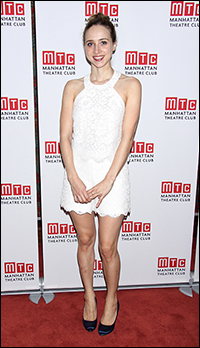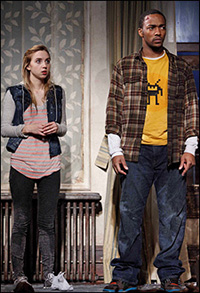
*
"You want to get the guy, you've got to act like the girl."
Those are surprising words to hear from Zoe Kazan, the outspoken actress and writer who is currently starring in the new play When We Were Young and Unafraid.
Written by Sarah Treem and directed by Pam MacKinnon, the world-premiere production is set in a shelter for women on the run from abusive husbands and follows a group of women who each possess very different notions of what it means to be female at a turbulent time in history.
Kazan plays Mary Anne, a young wife who, following a brutal attack from her husband, arrives at the shelter run by Agnes, who is played by Cherry Jones. She quickly influences Agnes' daughter Penny (Morgan Saylor), a teenager who excels in the classroom but does not have a prom date. Mary Anne steps in to help, and during a late-night talk with Penny she advises her to stop answering every question in class, ask the boy she likea for help and "act like the girl. Right now you're acting like the guy." The situation is a familiar one to Kazan, who recalled her own experiences of being lonely while attending high school. "All the stuff about, 'Why can't I raise my hand if I know the answer?' was very much my struggle," Kazan said. "Especially as I started to want a boyfriend and want to be a regular teenager. I felt so set apart by the schools I was applying to for college and knowing the answer in class. I remember sitting in English class, being like, 'Someone else, please raise your hand,' and feeling so lonely.
"And then my senior year, I was like, 'I'm not going to do this anymore,' and I stopped raising my hand," Kazan continued. "I would raise my hand every fifth question instead of every question. And it worked. I got a boyfriend. People started being nice to me. I dumbed myself down and didn't tell people where I'd gotten into school. There's a way in which I really went through that and came out the other end of it like, 'That f*cking sucked. That's not the answer either.' That conundrum that [Penny is] in, of feeling so identified by her mother but needing to break away, and feeling so lonely and wanting to be liked but not knowing how to do that without losing herself — I really self-identify. It's really interesting to be in the position of being the other person in that scene and giving the advice."
 |
||
| Kazan on opening night |
||
| Photo by Joseph Marzullo/WENN |
The film Kazan was promoting was "Ruby Sparks," a story of a young writer whose character of an ideal woman appears in his actual life, much to his amazement. When she develops from being a romantic idea into an actual person, problems arise. Some of the press surrounding the movie stated that Kazan wrote the film in response to the trope of "maniac pixie dream girl;" however, Kazan said that was not her intention.
"I think that that trope is evidence of a kind of larger issue that's very old — that's much older than that trope is," she said. "I think there's a way in which men have always idealized women, in ways that we have actually capitalized on, to be totally frank, and I think have been folded in culturally into the way we think about relationships in a lot of ways — like Valentine's Day. They bear offerings and we put on lingerie to make ourselves into more the ideal image."
Kazan was inspired to write the film when "thinking about how very lonely it can feel to feel really loved, when you don’t feel seen and how much I felt that way as a young woman in relationships — especially with men that were older than me. And the twin pull of feeling like: You didn’t see me, you didn’t really love me, you loved someone else; and also feeling incredibly indebted because the men I dated as a young woman really shaped in some ways who I am."
"I'd been thinking about all of those things and trying to find an imaginative in to that," she said. "One of the reasons I chafe at the notion that I wrote the movie in response to that trope is I think the trope is less pandemic than the application of the label. I've read articles that say that Katharine Hepburn in 'Bringing Up Baby' was a manic pixie dream girl. Or Annie Hall. Those are complicated characters. There's some way in which the use of that label enables the trope to continue. And that's part of what I wanted to dismantle. So when people started throwing that around, I felt like, it's not that narrow. The issue is not that narrow."
 |
||
| Zoe Kazan and Anthony Mackie in A Behanding in Spokane |
||
| Photo by Joan Marcus |
"I don't know that it will change on Broadway because of the financial demands," she added. "I really hope it will. Working with a female director on this, I think there's no difference because of the gender. The difference is because of the director. It's an obvious thing, but it's true. I really respond to the way that Pam directs — not because she's a woman but because the kind of director she is is the kind of director that helps me as an actor. And I just wish it wasn't an issue. I wish it wasn't something that was the first thing mentioned in an interview. It just feels like I wish that it wasn't something we had to talk about."
The issues raised in When We Were Young and Unafraid are timeless, according to Kazan, who said she read the play about 20 times before committing to playing Mary Anne, and described herself as "swept away" by the script.
"The more time I spent with it, the more I feel like the play isn't really political," she said. "It's about things that have to do with gender politics, but it's actually a very personal play. And it's about five people, especially these four women who are struggling — how to be a woman. How should a woman be?"
That question is one Kazan still struggles to answer, especially with regards to feminism. "I was doing press for [the movie 'What If'], and a woman asked me if I consider myself a feminist, and if so or if not, what it means to me. And of course, I do. I gave a long explanation and at the end of it, she said she'd been asking that question for five years, and I was the first actress she'd asked it to who said yes without qualification.
 |
||
| Daniel Radcliffe and Zoe Kazan in "What If." |
||
| Photo by Caitlin Cronenberg - © 2013 - F Word Productions Inc. |
Audiences will soon be watching Kazan in a new movie; she stars in the romantic comedy "What If," alongside Daniel Radcliffe, Mackenzie Davis and Adam Driver. "It's fun," she said. "[Daniel] is really funny. We do a lot of improv in the movie."
"I was just impressed because I feel like a lot of romantic comedies are either from the man or the woman's point of view. This is very well-balanced between the two of them," she said.
She expressed the same appreciation for multiple points of view being expressed in Treem's play.
"I think this play is a good corrective in some ways because you have women on every side of the spectrum of caring about women's lib and what it means to them to carry those values around or not carry those values around. But none of them are right or wrong. The play lifts the question in a way that is not exclusive, which I think is really cool."
(Carey Purcell is the Features Editor of Playbill.com. Her work appears in the news, feature and video sections of Playbill.com. Follow her on Twitter @PlaybillCarey.)









